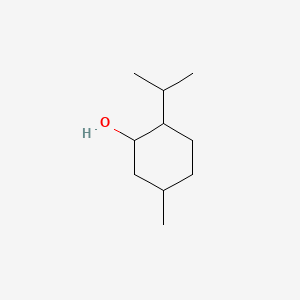|
Name: Menthol
Type: Topical analgesic
AKA: Peppermint, Menthol

|
|
II. Natural Derivative

|
|
III. Chemical Profile (IUPAC name)

|
|
IV. History
Menthol, a natural compound derived from peppermint, has been used for centuries for its cooling and soothing properties. It is widely used in medicinal products, tobacco, and cosmetics, reflecting its broad cultural and therapeutic significance.

|
|
V. Legal Information
Menthol is a compound used for its cooling effect in various products. It is not classified as a controlled substance but is subject to regulations concerning its use in consumer products. Global trends focus on managing its safety and efficacy rather than increased control. [Source: UNODC].
Key US Federal Policies:
Menthol is regulated by the FDA as an over-the-counter ingredient. It must meet specific standards for purity and labeling.
|
|
VI. Physical Effects
Menthol, a compound derived from mint, has been used for centuries for its cooling and soothing properties. It acts as a downer, providing relief from minor throat irritation and cough. Physical impacts include cooling sensation, slight muscle relaxation, and respiratory tract soothing. Short-term use is generally safe, but long-term exposure to high doses may lead to respiratory issues. Overdose risks are minimal but can cause gastrointestinal distress. Safe use involves following recommended dosages. Recent research focuses on its potential therapeutic benefits and safety profile.  |
|
VII. Psychological Effects
Menthol, a mild psychoactive compound, affects sensory perception rather than mood or cognition. It can produce a cooling sensation and mild mood enhancement. Long-term use does not have significant psychological impacts, though its effects are primarily sensory. Research focuses on its sensory and potential cognitive effects, with minimal long-term psychological impact.
 |
|
VIII. Culture
Menthol is a compound used in medicinal and cosmetic products for its cooling effect, classifying it as a mild stimulant. Short-term use provides soothing and cooling sensations, while long-term exposure can lead to skin irritation or respiratory issues. Overdose risks are low, but excessive use can cause gastrointestinal discomfort and respiratory irritation. Safe dosages are typically found in over-the-counter products. Recent research highlights its benefits in relieving minor ailments but notes potential irritation from excessive use. Physical effects include a cooling sensation and potential mild respiratory effects.
 |
